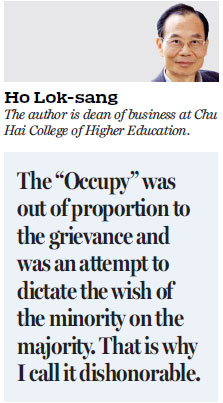Qualities responsible activists need to have
Updated: 2017-09-05 08:06
By Ho Lok-sang(HK Edition)
|
|||||||
Ho Lok-sang explains to a reader who took issue with his treatment of the 'Occupy' trio why their actions fail the honorable civil disobedience test
One reader of the article I wrote ("The morality and immorality of civil disobedience", Aug 22, 2017, China Daily Hong Kong Edition) questioned the reasonableness of the moral standards I held for those who defy the law in an act of civil disobedience. That reader challenged my contention that while the civil disobedience of Martin Luther King and Mahatma Gandhi was honorable, the protesting students' storming of the Legislative Council compounds in 2014 and the "Occupy Central" movement "were anything but civil" and hence not really honorable. That commentator argued that almost all protests would produce an impact on people's lives and would cause them inconvenience. When workers engage in strikes in a fight for better working conditions, when people demonstrate and march in streets to voice their concerns about public affairs, when students boycott classes in protest for injustice, he says, disruption of people's lives is inevitable. He also said that when Martin Luther King and his followers occupied the eateries reserved for whites and boycotted the buses reserved for white people; or when Gandhi mobilized people to engage in workers' strikes and "market strikes", ordinary people's lives were disrupted. He wrote that civil disobedience triggers people's reflections about social injustice, and serves to propel society to move forward. Speaking on behalf of Joshua Wong Chi-fung and the other student leaders who were jailed, he said there was no evidence the jailed trio incited their followers to beat the security guards up, and most of those who participated in the "recapture of the Public Square" "did not harbor violent motives".

In my original article, I emphasized the need for "judgment based on a willingness to put oneself in the shoes of others, and a sense of proportionality". I did not say that any disruption of other people's lives has to be avoided under all circumstances. At this juncture, let me quote Max Weber, the preeminent social thinker. He said that "three preeminent qualities are decisive for the politician: passion, a feeling of responsibility and a sense of proportion." Here, he was clearly referring to those politicians who care for the public interest. I am convinced that the jailed trio have passion. But do they have a sense of responsibility and a sense of proportion? What do sense of responsibility and sense of proportion mean?
A sense of responsibility to me means a willingness to consider the full consequences before any act. If the trio indeed cared for the public interest, they would have considered the implications of a huge crowd forcing their way into the LegCo compound. They would have realized that the unavoidable physical struggle between the crowd and the security guards will likely lead to injury. If the trio indeed cared for the public interest, they would have considered the legal responsibilities of their acts and would have been willing to face the consequences with calm. If the trio, and other "Occupy" leaders, indeed cared for the public interest, they would have considered the extent of the disruption to other people's lives due to their acts.
This brings us back to the need for a sense of proportion. I had written that "when some members of society are grossly mistreated, or taken as second-class citizens without the right to education, or without the right to take certain seats in a bus that is reserved for a superior race, or without the right to take senior positions in the government for reasons other than merit, there may be a case for civil disobedience. But even when there is a case for disobedience, there still needs to be a sense of proportionality." Can the trio or my critic demonstrate that there is gross mistreatment of some members of society, or that the law currently discriminates against some Hong Kong citizens? The government had allowed the students to legally assemble in specified areas and the police had warned them that their gathering was illegal after the specified time had elapsed. Instead of dispersing, they tried to storm into the LegCo compound. What social purpose did this serve? Is 79 days of "Occupy" not disproportionate to the extent of discontent about the Aug 31 framework?
Hong Kong people also need to be reminded that a contract is a contract. The Basic Law was promulgated after a long consultation, and it had laid out how candidates aspiring to run for the chief executive post were to be nominated. Hong Kong people at the time had agreed to the Nominating Committee mechanism and the central government had agreed to allowing Hong Kong people to eventually elect their chief executive given the framework. Although the Aug 31 framework did not please everybody, many Hong Kong people did not see this as a justification for "Occupy". Survey after survey conducted by Ming Pao showed that at no time were there more supporters of "Occupy" than opponents. The "Occupy" was out of proportion to the grievance and was an attempt to dictate the wish of the minority on the majority. That is why I call it dishonorable.
(HK Edition 09/05/2017 page12)